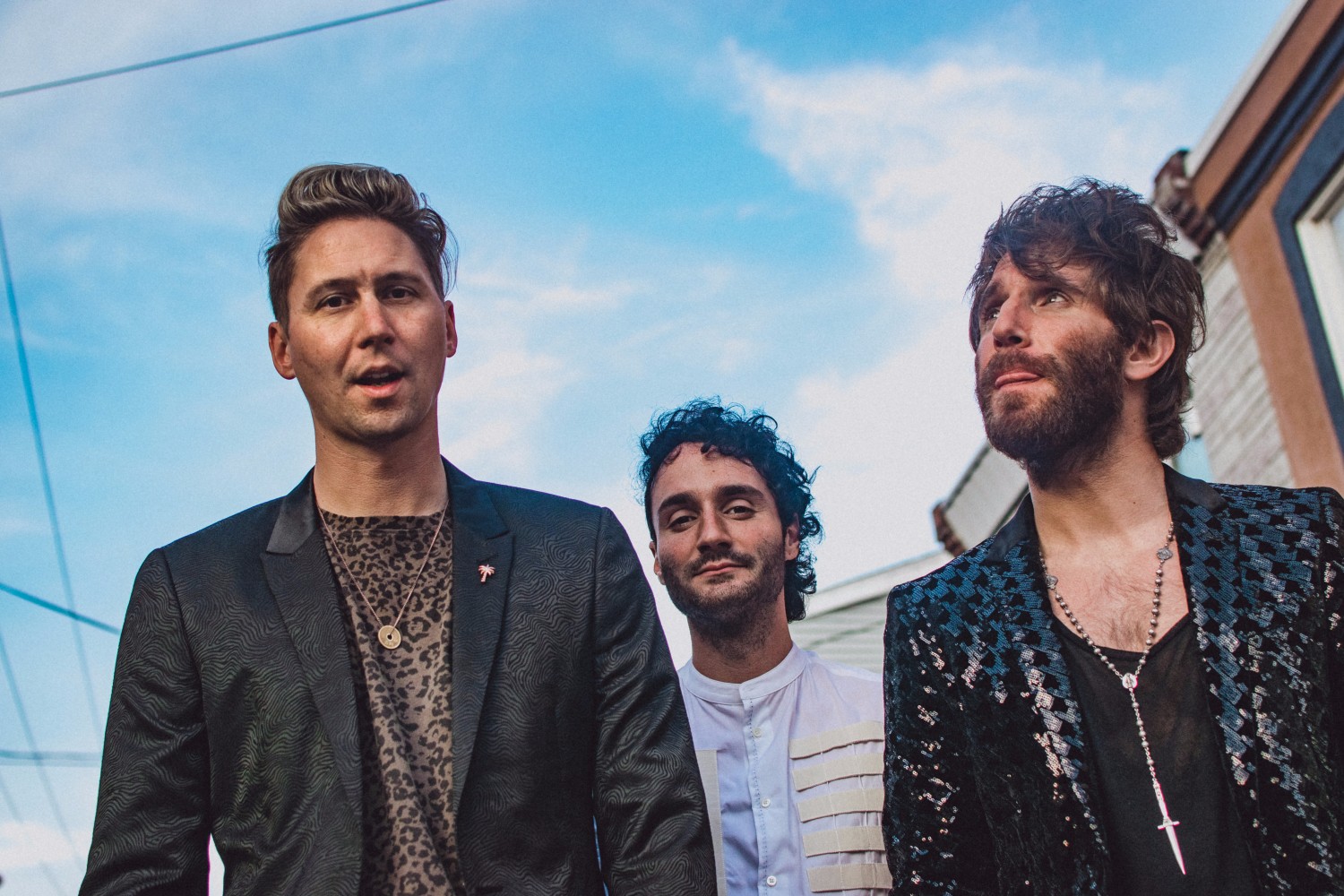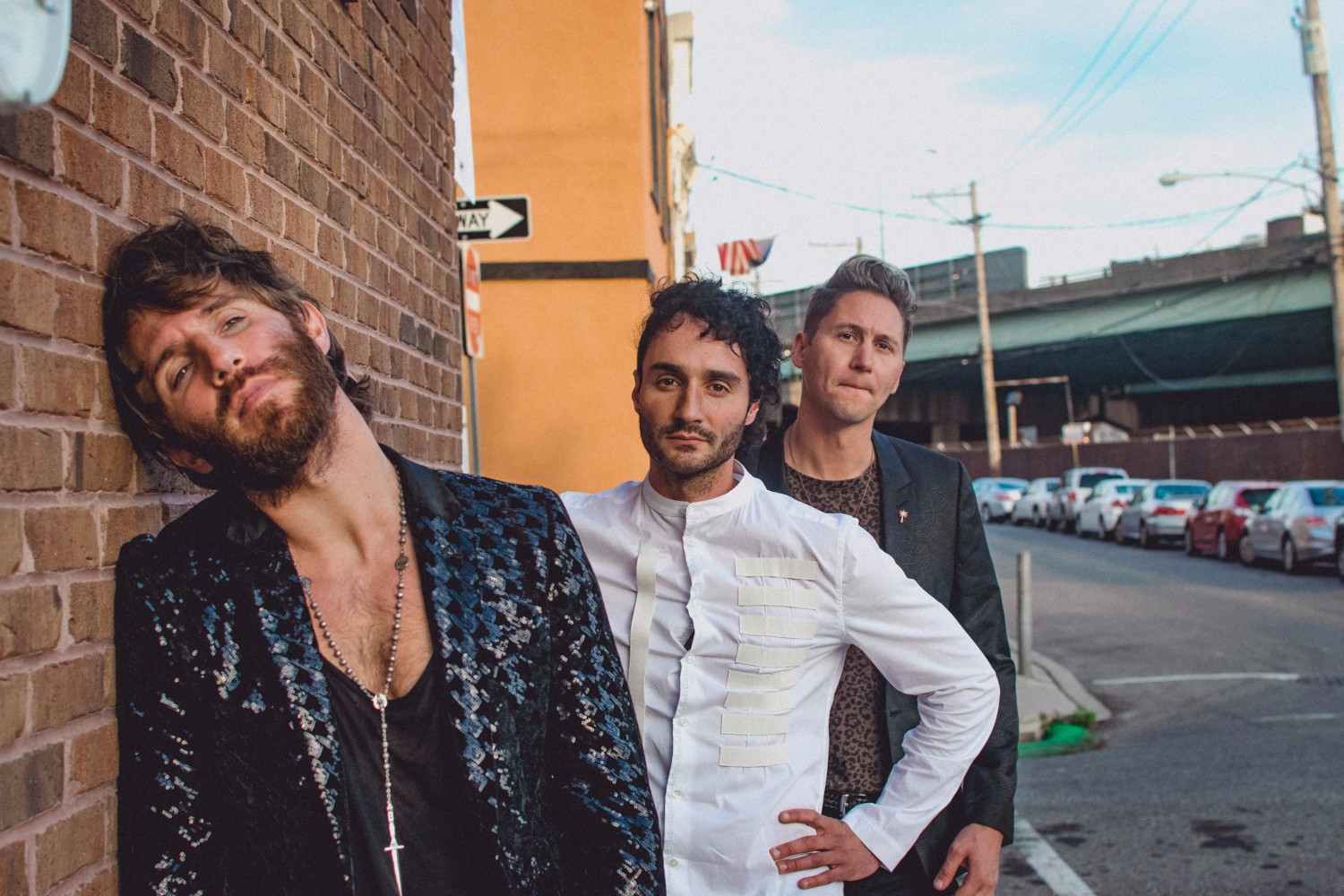Smallpools – Sean Scanlon, Beau Kuther, Mike Kamerman – first emerged as part of the giant wave of indie pop that crashed through American music between 2011 and 2013. Their larger-than-life debut single “Dreaming” spread like wildfire from the second it was released, but had fallen short of what they’d been promised – a chart smash.
Spending the two years that followed being put through the ringer known as the music industry again and again, by the time time their full-length finally saw its proper release, their momentum had come and gone, leaving an underwhelming album cycle in its wake. Since then they’ve undergone some changes – the loss of a member and a record label change to name a few, but have come out clean on the other side. Now operating much more independently, the trio has been reinvigorated, in their craft and in their hearts – and it shows on their majestic new EP, “The Science of Letting Go.”
Interview and Photography by Andy Gorel
Andy: You’re an LA band, but all from elsewhere. How’d you all come together?
Sean: It started with Mike and I. We lived in New York and New Jersey. We met back in 2007. We had old bands that toured together, and then when they dissipated we stayed in contact and wrote together on the East Coast. We’d just commute to each other’s parents houses and write music. Shortly after, we decided to make the trek to LA. Packed up his van, listened to some New Radicals, got out there, met a bass player just through some musicians – like my cousin was a musician out there – friends of friends – our bass player Joe pulled Beau into the mix, they’re both Oregonians. We started jamming and the chemistry was good. We all came from different bands that had failed and were giving it a last ditch effort – nothing left to lose. And that vibe was coming through in the jam sessions. Very carefree.
Andy: Were you guys playing around LA a lot before you got signed?
Sean: Not shows, but jamming.
Mike: It was quick, we got signed – our whole lives we were in bands trying to get signed, like 10 years – to get signed to a major label. That was like the unspoken goal since high school – get signed like all your favorite bands. We all got together in July, and got a record deal in March of the following year. We played a lot together in rehearsal spaces, writing the initial batch of songs. We played a few shows under fake band names, just so we could get used to playing together live.
A few labels wanted to come out to one of our shows, and we canceled that show so they wouldn’t come. The whole point of the fake shows was to get good enough to play a real show.
“‘Dreaming’ was on the radio, and we were playing fake shows. We were listening to our song on KROQ, pulling up to a show we were playing under the name Buffalo Cauliflower.”
Andy: So the timeline was: songs – fake shows – record deal…
Beau: Then a couple fake shows after that. Which actually label came to the very last of the fake shows. RCA’s radio team came because “Dreaming” was already on the radio.
Mike: Yeah “Dreaming” was on the radio, and we were playing fake shows. I was listening to our song on KROQ, pulling up to a show we were playing under the name Buffalo Cauliflower.
Beau: Yeah we were playing at Bootleg. I remember, you pulled up and were like “It’s on KROQ right now!”
Andy: That reminds me, there was a show I wanted to go to in July of that year, it was you guys, San Cisco, and Youngblood Hawke.
Beau: Oh, that one off in Clifton Park!
Andy: Yeah! I’m still pissed I didn’t go – one of few shows I still really regret not making it to. But I remember it was the fourth Smallpools show and I was thinking “Come on, nobody plays only their fourth show across the country on a bill like that.”
Mike: Yeah, that was very early on. I remember when that show happened, we were like “THE Youngblood Hawke? Like the one from the radio?” It was just a random show in New York. It didn’t make any sense.
Andy: “Dreaming” was released on Soundcloud for a bit before going to streaming services – it just appeared, but obviously was being pushed by RCA. Was the idea to make it look DIY and mysterious at first?
Mike: 100%. We got Neon Gold, who was, and still is a big tastemaker. I don’t think they’re as much of a blog anymore, just a record label. At the time they were the go-to, trendsetting blog. We became friends with them early on, so they agreed to premiere it. From there it kind of snowballed, and we wanted to keep it a secret. As did the label, that we were signed. If it seemed like were major label thing, it wouldn’t have seemed as genuine – although it was.
“We didn’t want it to seem like it was a put together thing, because it wasn’t. That was the idea behind going to DIY route.”
Sean: Yeah, we still wrote the song and went through the grind to get “Dreaming” to the point of what it was.
Beau: We didn’t want it to seem like it was a put together thing, because it wasn’t. That was the idea behind going to DIY route.
Mike: We didn’t want to put any pictures up – we just wanted the song to exist. I don’t think any pictures of us existed on the Internet until maybe a few months later when the EP came out.
Andy: It went crazy at the beginning. Were you guys expecting it to get as big as it did as quick as it did? I personally thought – and still do think – it’s a smash, but did you foresee that?
Sean: No, not at all.
Mike: I don’t even think we knew how it all worked. I remember when it came out, one of the producers, Ben, texted us in the morning and was like “Dude, people are liking it!” And I was like “How do you see that? Where do you go?” And then it started charting on iTunes, and I was like ”Oh, I guess that’s what happens.”
Andy: I guess it’s a true hit. Came from nothing really.
Sean: It garnered genuine reactions. I always feel like when you release something, there so much other stuff out there, and you’re just fighting gravity to keep it alive, and keep it in the chart position, wherever it’s at, to keep people listening. But “Dreaming” at the time definitely took on a weird set of legs that we did not expect.
Andy: So it took a bit, but you guys followed up with “LOVETAP!” It was cohesive, but had it’s moments – arena rock, top 40, quirky pop, indie rock, etc. Where were you guys when you were making these songs? Both sonically and lyrically, where was the inspiration coming from?
Mike: There were so many different stages of life in that album. We wrote the initial EP, released that, went on a bunch of tours, and then came back and spent two months working on what we thought was the finished album. Then we went back on tour, and thought the album was gonna come out in this four month span of these tours we were on. Then we found out it wasn’t, and they wanted more songs. So after that tour, we came back and wrote more songs, and at that point, that’s when people are giving your opinions on what they think they want to hear out of you. It was just a lot of time. We thought with the EP coming out in 2013, the album would be coming out in 2014, but with touring and people’s opinions, it kept getting delayed.
Beau: It’s when you have a lot of cooks in the kitchen – the timeline gets all fucked.
“There were a few we started just genuinely, in a rehearsal space jamming out. By the end of the album it was pretty grueling. We would go back to the studio and be like ‘Here we are back at the factory!'”
Andy: Yeah, especially as a baby band.
Mike: Sean, what do you think – inspiration?
Sean: Yeah, I think the first few songs came from more of a genuine place. It was just us, no one knew we existed. We were just in a room jamming the parts, trying to make them into a cohesive song. A few of them happened that way. A couple of the album songs we had started to write in those same rooms. Like “American Love” we had started to write in the same “Dreaming” era. There were a few we started just genuinely, in a rehearsal space jamming out. By the end of the album it was pretty grueling. We would go back to the studio and be like “Here we are back at the factory!”
Beau: “Start an idea – that’s not cool enough. Start another idea – that’s not cool enough. Start another idea…”
Andy: Which ones came out of that?
Sean: Actually, “Lovetap!” came out of that, but I love that song. That was just like a lightning bolt day. Something was great about that day. That was after a lot of bad shit, and we were just like “Alright, let’s do something cool.” (laughs)
Beau: We were kinda jammin’ that day, which was the difference. It wasn’t just like “Oh, play some cool riff.” I was playing drums in the other room, and everyone was just jamming.
Mike: I remember when we wrote that song, I was like “Fuck yeah!” In the process of making that album, “Dreaming” came and went. We were in the studio for the downfall of the song, and there were a few other bands in our peer group that were experiencing real success beyond what anyone would’ve thought. That put this extra pressure on us, like “Oh shit, now we need something that’s really gonna stick.”
Andy: Well the album definitely did well and gathered a loyal fanbase, but never had that second radio hit. Were you guys hoping for that second “Dreaming” or had you already exceeded expectations?
Mike: No, cause “Dreaming” never hit where we thought it was gonna.
Beau: We were bummed that “Dreaming” didn’t do what we thought it was gonna.
“We’ve been hearing this for five fucking years – “Dreaming should have been a smash hit.” But our whole life – which I’m sure many many millions of artists are trying to figure out life after their song was supposed to be a smash hit.”
Andy: I thought it was gonna be a smash. I was with a friend recently who’s an A&R and said he thought it was a total smash. I think everyone thought it was gonna be smash.
Sean: Yeah, but just like you said, it wasn’t (laughs). Everyone around us was telling us “This is gonna be the thing. Blah, blah, blah, blah…”
Mike: Things happened – label politics happened, and the song still lived on, but people stopped working for the song. We’ve been hearing this for five fucking years – “Dreaming should have been a smash hit.” But our whole life – which I’m sure many many millions of artists are trying to figure out life after their song was supposed to be a smash hit.
I think by the time the album was coming out, me personally, I don’t know how you guys felt (to Sean and Beau). I didn’t have high hopes for the album. I felt we had sat on the it for too long. It just didn’t feel like it was gonna happen. I think we liked the album, but I’m the pessimist of the group. I didn’t have high hopes for it.
Andy: What kept you guys going during the transition to being independent?
Sean: I think what kept us going was somehow we got into the college circuit. We got a lot of college shows.
Andy: Those college shows where they just fork over the cash.
Sean: (laughing) Yeah!
Mike: That’s also when The Chainsmokers blew up, and the remix of “Dreaming” was getting played in every country, every college. That kind of gave the song a new life. Then these college shows started coming in, and at that point, Joe our bass player was really getting into having a family. I think it was a really conscious thing, where we were all like “This is the closest we’ve ever been to the band not existing. We lost a member. We’re independent.” We all talked and were like “Yo, should we keep going?” I think we had a few conversations like that.
“It’s a lot less pressure. You’re not living in fear that you’re letting someone down and you’re gonna get dropped.”
Andy: The new EP, “The Science of Letting Go” came out earlier this year, and it’s your first independent release. How has that made things different for you guys as a band?
Mike: Well we’re working with Kobalt.
Sean: Yeah, Kobalt has been good. We had a more meticulous plan of releasing these songs than something we tried earlier. We tried to release a song called “Run With The Bulls.” It was a minute and a half song, and we did a video for it. We thought it was a cool, raw, rock song – a little different.
Mike: I think the plan was more concise. We were more knowledgeable of the plan than we were for the “LOVETAP!” release. Not to say anything bad about RCA – we liked RCA. But at Kobalt we were more involved.
Beau: There was definitely a plan. We definitely knew what we wanted to do.
Sean: Yeah, we got a lot of cool stuff with Kobalt like the playlisting.
Mike: It’s cool. It’s a lot less pressure. You’re not living in fear that you’re letting someone down and you’re gonna get dropped.
Andy: So the new songs, how was the inspiration change. Sonically, lyrically, who’s inspiring you? Or is it just what happens when the three of you get together?
Sean: I think it’s a little bit of everything. A lot of lightning bolt moments. We jam a lot. There were a lot of different mood swings, and changes in sound.
Mike: We have a lot of songs that are close to being finished, that were all written in different periods of time throughout that last year and a half to two years since the last album. This EP, lyrically, we thought all these songs work together – so it made sense to make it a small package of music.
“Now we can all just get in a room and play. I feel like we had more restrictions of where we could or couldn’t go musically. Now, if we like it, we just take it to the finish line and see what happens.”
Andy: How do you see them as a different era than “LOVETAP!”? – even looking how music/the industry has changed since 2015 is wild.
Mike: Industry-wise it’s so different cause we came about in a time where being in a band was cool again for a short period of time.
Beau: Yeah, now being in a band is not cool for the labels in terms of signing.
Mike: Yeah, like all the bands we were touring with a few years ago, most of them don’t even exist anymore. Some of them got dropped, some just ended, and a few have songs that got ingrained in culture – so they’re good. It’s just a different time for that since the charts have changed. Everyone’s following Spotify charts and Viral charts. Labels are signing that now, and not as many bands. As a band it’s a little different.
Beau: It’s weird cause it’s just different now. Hip-hop rules the world. So it’s hard for a band to be as big as they once were.
Mike: At this point I’ve stopped really caring about trying to figure it out. During the “Lovetap!” process I was trying to figure it out. I think at first we were really naive, and started the band – wrote all these songs, got the deal. When we were doing the album, we were trying to figure out what we were supposed to do with that deal. Now that it’s gone I feel way less pressure. We can all just get in a room and play. I feel like we had more restrictions of where we could or couldn’t go musically. Now, if we like it, we just take it to the finish line and see what happens.
Andy: Building from this EP, where would you guys like to take things next?
Sean: I think just songs as they get finished. Maybe an EP.
Mike: I think smaller packages work well. I think we have to build this thing up again.
Sean: Albums only work for mega artists.
Andy: Yeah, it’s an exclamation point. Build, build, build – then go for the slam dunk.
Beau: But even for “LOVETAP!” it was build, build, build, then it was too late.
Mike: The album came way too late, and it was too many songs. It was new songs, old songs. We played all those songs live for three years. I think just small packages of music, and touring. The EP, for us, wasn’t shattering records or anything, but I think it’s been really good for us.
Beau: I think it came out well – the roll-out was well-done, it was received well – we felt good about it. It was good to see genuine reactions of people being excited when the new songs came out.
Mike: Yeah we didn’t know what to expect at all, but we’re happy with how it’s going.
Smallpools on Instagram
Smallpools on Facebook
Smallpools on Twitter

















